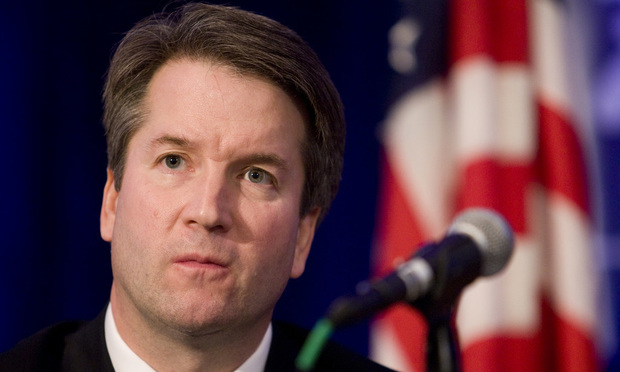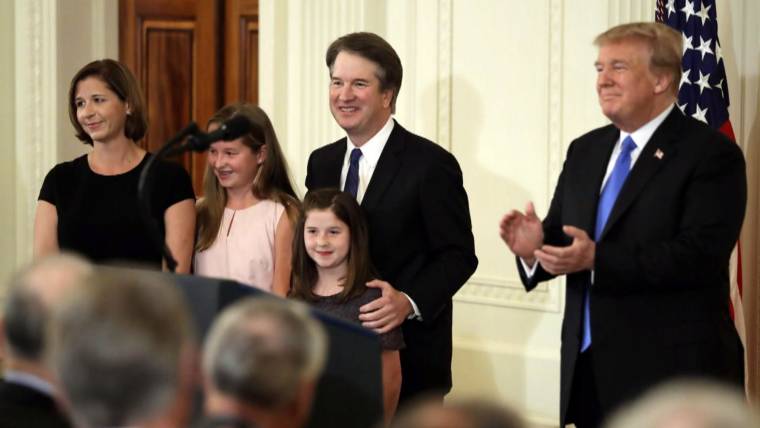After days of consideration, President Donald Trump on Monday night put to rest all speculation about whom he would nominate to fill retiring Justice Anthony Kennedy’s place on the high court. He
named a leading light on the highly influential U.S. Circuit Court of Appeals for the District of Columbia: Judge Brett Kavanaugh (shown). Constitutionalists were hoping that Trump’s pick would be an originalist — someone who believes that the Constitution should be understood on the basis of what it actually says and the intent of the people who drafted it. But although Kavanaugh has stated that judges should not make law, his judicial record shows that he relies heavily on past judicial precedents that have often been in conflict with the clear language of the Constitution.
The president didn’t make up his mind until the very last minute, carefully considering Judges Hardiman and Barrett, whose credentials made them close seconds.
Kavanaugh, age 53, holds BA and JD degrees from Yale College. He spent his early years in private practice in Washington, D.C. before accepting a position as a law clerk for Supreme Court Justice Anthony Kennedy in 1993. He became associate counsel to President George W. Bush in 2001. In 2003 he was named assistant to the president and his staff secretary before being nominated to the D.C. Circuit. That nomination was bottled up for nearly three years before clearing the Senate in 2006.
Kavanaugh took significant roles in drafting the Starr Report, which urged the impeachment of President Bill Clinton, and led the investigation in the “suicide” of Clinton aide Vince Foster.
In the last 12 years Kavanaugh has drafted more than 300 opinions while on the bench of the D.C. Circuit Court of Appeals.
His fight to be confirmed by the Senate is expected to last well into late summer, but his confirmation is expected well before the high court’s fall session begins in October.
That confirmation battle has already begun, with forces on both sides committing to spending millions either to support his confirmation or to deny it. The fight takes place as the November midterm elections draw ever closer, and both parties are hoping that the outcome will serve their collective but significantly different interests.
Senate Majority Leader Mitch McConnell (R-Ky.) cannot afford to lose any Republicans, especially since Senator John McCain (R-Ariz.) remains at home being treated for brain cancer. The margin enjoyed by Republicans is so close that the final vote for confirmation of Kavanaugh may be cast by Vice President Mike Pence.
Democrats are hoping to persuade Senators Susan Collins (R-Maine) and Lisa Murkowski (R-Alaska) to jump ship and join them in opposing the judge’s confirmation, while Republicans and the judge’s supporters are working to persuade three red-state Democrats running for reelection in November to join them in supporting his confirmation. Those three — Senators Heidi Heitkamp (D-N.D.), Joe Donnelly (D-Ind.), and Joe Machin (E-W.Va.) — are facing existential questions. Each voted in favor of Neil Gorsuch’s confirmation last year but now must decide how to vote on Kavanaugh’s. If they vote for his confirmation, each will alienate a large part of their electoral base and almost virtually guarantee their losses in November. If they vote against Kavanaugh, they will alienate the larger part of each state’s electorate which more than likely will replace them with Republicans in the fall, giving that party a significantly larger majority in the Senate going into the next congressional term.
Once confirmed, Kavanaugh will be the center of attention as new cases come before the high court. The Wall Street Journal noted that “Justice Kennedy, though a conservative, has long been a swing vote on the court, sometimes siding with liberal justices” while Kavanaugh is expected to hew closer to the Constitution in critical cases. Based on previous decisions, Kavanaugh has revealed positions comforting to limited government advocates. For example, the EPA has long been a target of Kavanaugh’s opinions and dissents, criticizing how the agency under Obama implemented “clean air” rules while ignoring the costs of such rules borne by the agency’s targets.
He has also been highly critical of the unconstitutional nature of the Consumer Financial Protection Bureau (CFPB). He ruled against it in 2016 because its director couldn’t easily be removed by the president. In general, wrote Kavanaugh, “independent agencies collectively constitute, in effect, a headless fourth branch of the U.S. government. They hold enormous power over the economic and social life of the United States. Because of their massive power and the absence of Presidential supervision and direction, independent agencies [such as the CFPB] pose a significant threat to individual liberty and to the constitutional system of separation of powers and checks and balances.”
He supported religious liberty in the famous case Priests for Life v. HHS where he wrote that “the regulations [imposed by the HHS] substantially burden the religious organizations’ exercise of religion because [those] regulations require the organizations to take an action contrary to their sincere religious beliefs.” He included a line that roused concerns among religious conservatives, however, adding that Supreme Court precedent “strongly suggests that the government has a compelling interest in facilitating access to contraception for the employees of these religious organizations.”
In another case Kavanaugh also noted that precedent, to him, carries the weight of settled law: “all parties to this case [Garza v. Hargan] recognize Roe v. Wade and Planned Parenthood v. Casey as precedents we must follow.”
That simply is not so. Consider several instances where the Supreme Court’s opinions were later overturned by another decision by the court or by constitutional amendment. In 2003 the Supreme Court decided in Lawrence v. Texas to reject its previous ruling in Bowers v. Hardwick upholding the anti-sodomy law in Texas. Wrote Justice Anthony Kennedy, “Bowers was not correct when it was decided, and it is not correct today. It ought not to remain binding precedent. Bowers v. Hardwick should be and now is overruled.”
In 2010 the Supreme Court’s ruling in Citizens United v. Federal Election Commission overturned Austin v. Michigan State Chamber of Commerce (1990). In Citizens the court ruled that corporate political spending is legal for a simple reason: money equals speech and therefore corporations have the same right to free speech as do individuals.
The 13th and 14th Amendments in effect overturned one of the most pernicious decisions by the Supreme Court: Dred Scott v. Sandford (1857). The original 6-3 decision declared that black people were inferior to whites, weren’t and couldn’t be U.S. citizens, had no right to file federal lawsuits, and were property that couldn’t be taken from their owners without due process.
And the Supreme Court corrected itself in 1954 with its opinion in Brown v Board of Education of Topeka, Kansas which overrode Plessy v. Ferguson (1896) in which the court ruled that Louisiana’s “separate but equal facilities” laws were constitutional.
Those expecting great things from Kavanaugh, once he is confirmed to the high court, may be disappointed. But the chances that President Trump will have still another opportunity to move the court back to the Constitution continue to improve over time. Justice Ruth Bader Ginsburg turned 85 in March and Justice Stephen Breyer turns 80 in August. And the names that Trump didn’t pick from his list of potential nominees will still be there.
Imagine a Supreme Court enjoying a majority of justices coming from the originalist or textualist schools, including not only Thomas, Alito, Gorsuch, and Kavanaugh, but Hardiman and Barrett as well. It could happen.


